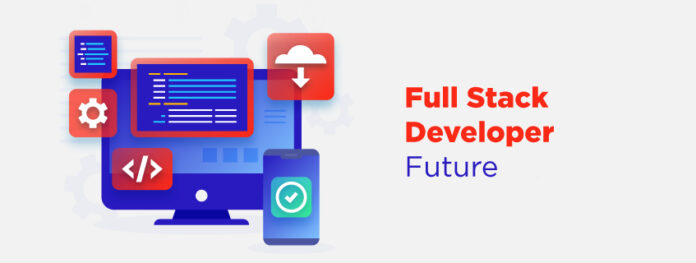In today’s digital age, where technology drives innovation and business transformation, full stack developers have emerged as versatile professionals capable of handling both front-end and back-end development tasks. With their comprehensive skill set and ability to work across the entire stack of a web application, full stack developers are in high demand across industries. In this article, we’ll delve into the future scope and demand of full stack developers, exploring the evolving landscape of technology and the opportunities it presents for professionals in this field.
Versatility in Technology Stack:
One of the key advantages of being a full stack developer is the versatility in technology stack. Full stack developers are proficient in both front-end technologies such as HTML, CSS, JavaScript, and frameworks like React, Angular, or Vue.js, as well as back-end technologies such as Node.js, Python, Ruby on Rails, or Java. This broad skill set allows them to adapt to different project requirements and technology trends, making them indispensable assets for organizations seeking flexible and agile development teams.
End-to-End Development Capabilities:
Full stack developers possess the ability to handle end-to-end development tasks, from conceptualizing and designing user interfaces to implementing server-side logic and database management. By having a holistic understanding of the entire development process, full stack developers can streamline workflows, improve collaboration between teams, and deliver high-quality solutions within tight deadlines. Their proficiency in both front-end and back-end development reduces dependencies on multiple specialists, leading to faster time-to-market and cost-effective project execution.
Rising Demand in Startups and Small Businesses:
Startups and small businesses, with their limited resources and need for rapid product development, often seek full stack developers who can wear multiple hats and contribute across various areas of the development lifecycle. Full stack developers’ ability to build MVPs (Minimum Viable Products) quickly, iterate based on user feedback, and scale applications as they grow makes them invaluable assets for startups looking to disrupt markets and gain a competitive edge. As the startup ecosystem continues to thrive, the demand for full stack developers is expected to rise significantly.
Emphasis on Cross-Platform Development:
With the proliferation of mobile devices and the increasing demand for cross-platform applications, full stack developers with experience in mobile app development frameworks such as React Native, Flutter, or Xamarin are in high demand. Full stack developers who can build responsive web applications and native mobile apps using a single codebase have a competitive advantage in the job market. As organizations prioritize cross-platform development to reach a wider audience and enhance user experience, the demand for full stack developers with mobile development skills is likely to grow.
Shift Towards Microservices and Cloud-Native Architecture:
The shift towards microservices architecture and cloud-native development has reshaped the way applications are built, deployed, and scaled. Full stack developers proficient in containerization technologies such as Docker and container orchestration platforms like Kubernetes are in demand for building scalable, resilient, and cloud-native applications. Their ability to design, deploy, and maintain microservices-based architectures aligns with modern software development practices and positions them as key contributors to digital transformation initiatives.
Continuous Learning and Adaptability:
In the fast-paced world of technology, full stack developers must continuously update their skills and stay abreast of emerging trends and technologies. The ability to learn new languages, frameworks, and tools quickly and adapt to changing requirements is essential for maintaining relevance and competitiveness in the job market. Full stack developers who invest in continuous learning, pursue certifications, and contribute to open-source projects are likely to have better career prospects and opportunities for advancement.
Full Stack Development has gained immense popularity in the tech industry due to its versatility and demand. In India, where the IT sector is flourishing, numerous training courses are available to help aspiring developers kickstart their careers in full stack development. This section serves as a guide to navigating the landscape of full stack developer training courses in Gorakhpur and in India, offering insights into key features, opportunities, and considerations for prospective learners.
Understanding Full Stack Development:
Before delving into training courses, it’s essential to understand what full stack development entails. A full stack developer is proficient in both front-end and back-end technologies, capable of building and maintaining entire web applications. This includes expertise in front-end languages like HTML, CSS, and JavaScript, as well as back-end technologies such as Node.js, Python, Ruby on Rails, or Java. Additionally, full stack developers are familiar with databases, version control systems, and deployment platforms, enabling them to handle end-to-end development tasks.
Diverse Range of Courses:
Full stack developer training courses cater to individuals with varying levels of experience, educational backgrounds, and career aspirations. From beginner-friendly bootcamps to in-depth certification programs, there are options available to suit every learner’s needs. Courses cover topics such as web development fundamentals, front-end frameworks (e.g., React, Angular, Vue.js), back-end technologies, databases, version control, cloud computing, and more. Some courses may also include specialized tracks in areas like mobile app development, e-commerce, or software architecture.
Renowned Institutions and Training Providers:
Several esteemed institutions and training providers offer full stack developer courses in India, providing students with access to quality education and resources. Institutes such as Coding Ninjas, UpGrad, Simplilearn, and Aptech offer comprehensive full stack development programs taught by industry experts and experienced instructors. Additionally, online platforms like Udemy, Coursera, and edX provide a wide range of full stack developer courses, allowing learners to study at their own pace and convenience.
Practical Learning and Hands-On Projects:
Effective full stack developer training courses prioritize practical, hands-on learning, allowing students to apply theoretical concepts to real-world projects and scenarios. Courses often include lab sessions, coding exercises, and capstone projects where students can build and deploy full-fledged web applications. By working on hands-on projects, students gain valuable experience, develop problem-solving skills, and build a portfolio of work that showcases their capabilities to potential employers.
Industry-Relevant Curriculum and Technologies:
Best Full stack developer training courses are designed to be industry-relevant, reflecting the latest trends, technologies, and best practices in the field. The curriculum covers a wide range of topics, including front-end and back-end development, databases, RESTful APIs, microservices architecture, cloud computing, DevOps practices, and more. Courses also introduce students to popular tools and frameworks such as Git, Docker, AWS, Firebase, and Heroku, preparing them for real-world development environments.
Career Opportunities and Growth:
Completing a Full Stack Developer Training Course in Mumbai & all other cities in India. Opens doors to a multitude of career opportunities in India’s thriving IT industry. Graduates can pursue roles such as full stack developer, web developer, software engineer, application developer, or technical consultant across diverse sectors such as IT services, product development, finance, healthcare, e-commerce, and more. With the increasing demand for full stack developers in the job market, driven by the growing need for versatile and agile development teams, graduates can expect ample opportunities for career growth and advancement.
Conclusion:
In conclusion, the future scope and demand for full stack developers are bright and promising in today’s technology-driven world. With their versatility, end-to-end development capabilities, and proficiency in emerging technologies, full stack developers are well-positioned to meet the evolving needs of businesses across industries. As organizations embrace digital transformation, prioritize cross-platform development, and adopt modern software development practices, the demand for full stack developers is expected to continue growing. By staying updated on industry trends, honing their skills, and embracing lifelong learning, full stack developers can thrive in their careers and contribute to the innovation and advancement of technology.



